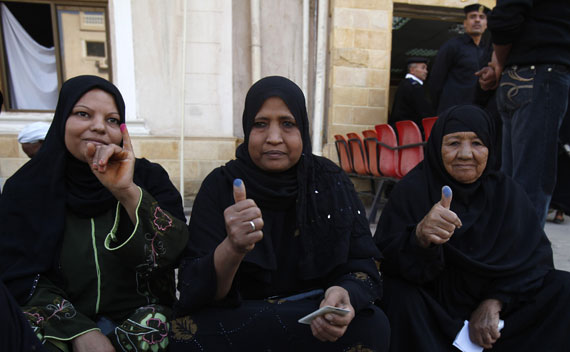Egypt: Her Excellency, Madame President?
More on:

My friend, Bassem Sabry, weighs in on the significance of Egypt’s first female presidential candidate.
While many observers have spent the past few months arguing over the presidential candidacies of Dr. Mohammed ElBaradei, Amr Moussa, Dr. Abdel Monem Abul Fotouh, and even Dr. Selim El Awwa, among others, there is one candidate with 764 fans on her Facebook Supporters’ page (compared to ElBaradei’s 142,000), who seems to have fallen off the public’s radar in Egypt and the West. Ironically, she happens to be the candidate whom I find to be one of the most (if not the most) significant of all.
In early April, Bothaina Kamel, a female television presenter and media figure, announced that she would run for the office of the presidency. In a society where the idea of a woman leading a country, the judiciary, or serving any similar role is discouraged by both culture and religion (indeed, it is often outright banned), the presence of a woman in elections stirs up strong reactions from the public. A cursory glance at the news articles that have mentioned her after she declared her candidacy feature such statements as: “Are we so out of men that we would be run by a woman?”, “The forces of Masonic liberal secular atheism are at work again!”, “we don’t want her deviously inciting our women to forget their role as mother and wife!”, and many more of the sort. In fact, quite a few hardline Islamic websites that adopt a strict interpretation of the Hadith that says: “People led by a woman will never succeed,” feature commentators calling for mutinies and civil disobedience if Kamel, or any other woman for that matter, wins the presidency or even the office of vice president or prime minister.
But unlike every single time an unknown activist or some adjunct professor decides to make a “symbolic run” in some Arab country, Kamel’s candidacy carries more weight than many observe, even though she has no realistic chance of winning.
What makes Kamel’s position unique is manifold. First, she enjoys instant recognition on a national level as a result of her career as a public figure. Second, she has the proper opposition credentials stemming from her longtime membership of the Kefaya! Movement. Third, throughout her tenure with Orbit TV, she expressed a fair share of criticism aimed at the Mubarak administration and its figures, while continuing during (and after) the revolution to play an active role in exposing biases in the official state media. Moreover, Kamel was one of the first to break from the taboo of criticizing the SCAF in the media, and was summoned for investigation by the military only to be released shortly thereafter. Since then, she has adopted a more prominent and confrontational attitude toward the SCAF—a rarity among presidential candidates—most of whom seek ties with (if not the full approval of) the Council.
Her most recent head-turner was when she announced that she was joining the April 6th Movement. This came only 30 minutes after SCAF had issued Statement 69, which accused the Movement of attempting to cause "a rift between the people and the army." It was a clear act of defiance that won her a lot of instant applause from pro-revolutionary circles.
Even more interesting is Kamel’s radically different approach in communicating with the public. While most of the candidates have embraced social networking, they tend to focus on releasing one-sided and carefully crafted statements, and often have full-time managers for their Twitter and Facebook accounts. In contrast, Kamel is herself particularly active on Twitter, responding to most queries she receives, continuously communicating her opinions and whatever newsworthy material she comes across, often answering even the most personal of questions , displaying an interest in the opinions of her followers and fans, and engaging in honest and often productive discussions with them. On the ground, she takes part in protests and sit-ins as a full participant, and regularly travels to flashpoints around the country as they happen providing her own account to her online followers, all while actively participating first hand in them as they unfold. While many still will not vote for her, her style is solidifying her reputation as a real activist and as a substantial yet accessible “presidential candidate you actually can talk to,” giving her a degree of personal popularity with the activist community.
The fact that a strong, opinionated, very recognizable, articulate, media-savvy, professional, and successful woman will run for president of the soon-to-become largest Arab democracy after a revolution that helped to pave the way for the entire Arab Spring, will ensure her a degree of real coverage and interest, both locally and regionally, come election time. The real significance of Kamel’s candidacy is that it can actually shatter many of the misconceptions and traditional attitudes regarding women’s role in Society, and can turn the tides of the debate over the “right” of a woman to run for leadership roles in an Arab and Muslim country. In a region with a host of gender biases and an active Islamist current vying for supremacy, at a time when political and social values are actually being rewritten, and when women across the Arab world are fighting to get their basic rights, the shockwaves of a legitimate female candidacy could be massive and fundamentally transformational, even if such a candidacy does not result in victory.
You can follow Bassem Sabry on Twitter @bassem_sabry
More on:
 Online Store
Online Store
